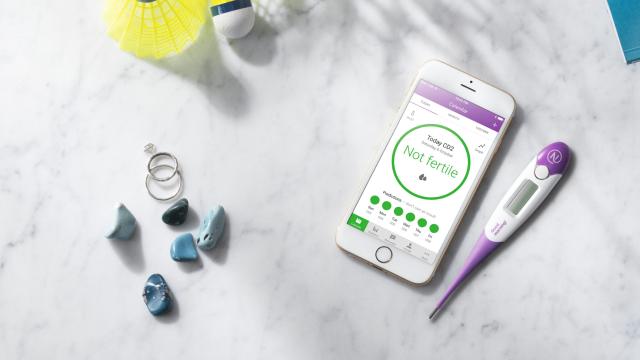Couples in the US looking to either conceive or avoid pregnancy will now have a new tool available to them. Last week, the Food and Drug Administration announced it has permitted a digital birth control app to be marketed as such in the US. The app, called Natural Cycles, is the first medical device of its kind to be cleared by the FDA but hasn’t come without its share of controversy in other countries where it has already received clearance.
The app styles itself as a digital upgrade to the so-called rhythm method, which involves predicting the course of your cycle through your previous menstrual history. The app from Sweden-based company Natural Choices uses an algorithm to predict where women are in their monthly menstrual cycle, allowing them to decide if and how they’ll have sex (with or without protection) when they’re most likely to be fertile. The algorithm’s predictions mainly rely on minute changes in daily temperature readings taken by users, with days marked green considered non-fertile and days marked red fertile.
The process of ovulation, when a woman’s egg becomes ready to be fertilised, causes a women’s average body temperature to rise less than one degree. So in order for the app to calculate a women’s likelihood of being fertile, users need to input readings from a digital thermometer that measure temperature past the two digits after the decimal.
The app was cleared for marketing through the FDA’s de novo premarket review pathway, which calls for a speedier review process for low- to moderate-risk medical devices that provide a new use to the public. And according to the research reviewed by the FDA, the app appears to be as good at preventing pregnancy as other contraceptive methods.
The agency evaluated clinical studies that collectively looked at 15,570 women who used the app for at least eight months. The app’s failure rate at preventing pregnancy when used perfectly was deemed to be 1.8 per cent. That means fewer than two women out of 100 could expect to become pregnant in a year if they had only sex on days when the app judged them to be non-fertile, or if their other contraception failed while they had sex on fertile days. Its typical-use failure rate, assuming that women might have unprotected sex on days they’re predicted to be fertile or if they have sex on days the app mistakenly predicts them to be non-fertile, was 6.5 per cent. These rates are comparable or even superior to those of other contraceptives, including condoms.
“Consumers are increasingly using digital health technologies to inform their everyday health decisions, and this new app can provide an effective method of contraception if it’s used carefully and correctly,” Terri Cornelison, assistant director for the health of women in the FDA’s Center for Devices and Radiological Health, said in a statement. “But women should know that no form of contraception works perfectly, so an unplanned pregnancy could still result from correct usage of this device.”
The app has already gotten in some hot water over these failures. In January, Endgadget reported, a hospital in Sweden reported the app to the country’s regulatory agency after finding that 37 women became pregnant and obtained abortions from September to December of last year while using it as their main form of contraception. The company responded these unplanned pregnancies should be seen as an example of the small failure rate expected with typical use and reiterated that no form of contraception should be considered foolproof.
According to the company, more than 600,000 women in 160 countries have subscribed to the app, with three-quarters using it as a contraceptive method. The app costs $US80 ($110) for an annual subscription, or $US10 ($14) monthly, and the company provides a high-sensitivity thermometer with the yearly subscription.
